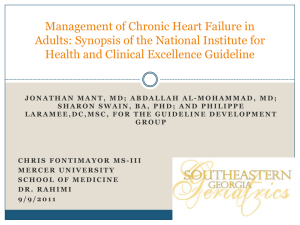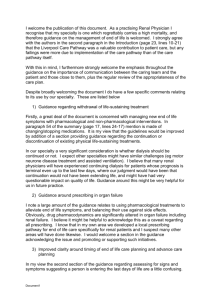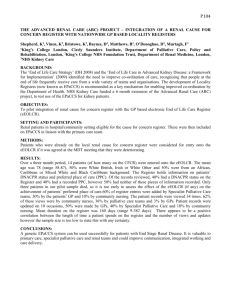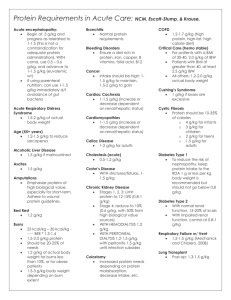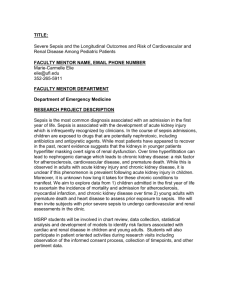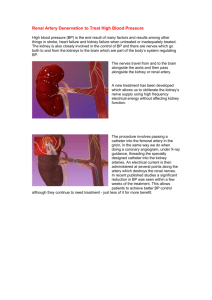Supplemental Content - JACC: Heart Failure
advertisement
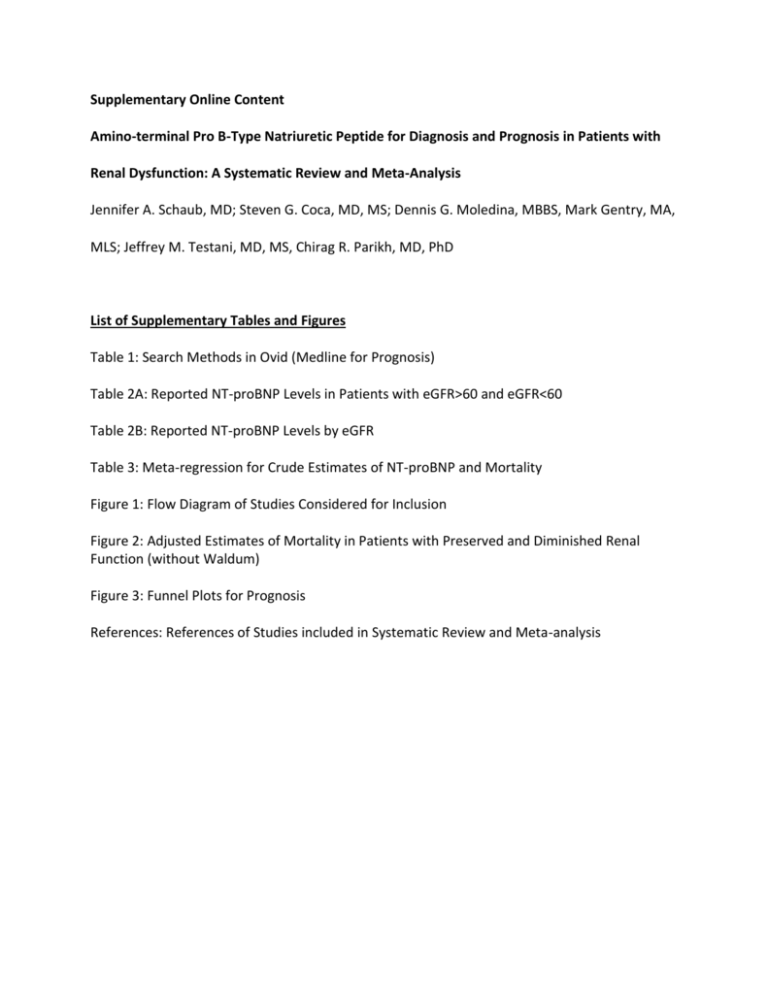
Supplementary Online Content Amino-terminal Pro B-Type Natriuretic Peptide for Diagnosis and Prognosis in Patients with Renal Dysfunction: A Systematic Review and Meta-Analysis Jennifer A. Schaub, MD; Steven G. Coca, MD, MS; Dennis G. Moledina, MBBS, Mark Gentry, MA, MLS; Jeffrey M. Testani, MD, MS, Chirag R. Parikh, MD, PhD List of Supplementary Tables and Figures Table 1: Search Methods in Ovid (Medline for Prognosis) Table 2A: Reported NT-proBNP Levels in Patients with eGFR>60 and eGFR<60 Table 2B: Reported NT-proBNP Levels by eGFR Table 3: Meta-regression for Crude Estimates of NT-proBNP and Mortality Figure 1: Flow Diagram of Studies Considered for Inclusion Figure 2: Adjusted Estimates of Mortality in Patients with Preserved and Diminished Renal Function (without Waldum) Figure 3: Funnel Plots for Prognosis References: References of Studies included in Systematic Review and Meta-analysis Table 1: Search Methods in Ovid (Medline for Prognosis) 1. Natriuretic peptide, brain/ 2. B type natriuretic peptide*.mp 3. Brain natriuretic peptide*.mp 4. Bnp*.mp 5. Probnp*.mp 6. pro bnp*.mp 7. Nt probnp*.mp 8. Ntprobnp*.mp 9. Natriuretic peptide type b.mp. 10. or/1-9 11. exp kidney disease/ 12. (chronic kidney or chronic renal).tw. 13. (ckf or ckd or cki or crf or crd or cri or esrd or eskf or esrf).tw. 14. (pre-dialy$ or predialy$).tw. 15. ur$emi$.tw. 16. exp Renal Replacement Therapy/ 17. (haemodialysis or hemodialysis).tw. 18. (hemofiltration or haemofiltration).tw. 19. (hemodiafiltration or haemodiafiltration).tw. 20. (CAPD or CCPD or APD).tw. 21. dialysis.tw. 22. (end stage kidney or end stage renal or endstage kidney or endstage renal).tw. 23. (acute renal failure or acute kidney failure or ARF or AKF).tw. 24. (acute kidney injury or AKI).tw. 25. (acute renal insufficienc* or acute kidney insufficienc*).tw. 26. acute tubular necrosis.tw. 27. acute kidney tubular necrosis.tw. 28. ATN.tw. 29. kidney fail*.tw. 30. renal fail*.tw. 31. (kidney insufficienc* or renal insufficienc*).tw. 32. (glomerular adj3 filtration adj3 rate).tw. 33. gfr.tw. 34. or/11-33 35. exp mortality/ 36. prognosis/ 37. follow up studies/ 38. incidence/ 39. mortality.tw. 40. prognos*.tw. 41. predict*.tw. 42. course*.tw. 43. or/35-42 44. 10 and 34 and 43 Table 2A: Reported NT-proBNP Levels in Patients with eGFR>60 and eGFR<60 NT-proBNP Level (pg/ml) eGFR<60 Author, Year Statistic eGFR>60 Fu, 2013 Median 298.6 1027.5 Gorrison, 2007 Maximum 1800 4500 Palmer, 2009 Median (IQR) 888 (554-1501) 1370 (918-2593) Van Kimmendade, 2006 Median (IQR) 3045 (1345-7620) 7214 (2757-16160) IQR, interquartile range; eGFR, estimated GFR (ml/min/1.73m2) Table 2B: Reported NT-proBNP Levels by eGFR Study, Year Statistic Patient Pop NT-proBNP Level (pg/ml) eGFR 30-59 eGFR>90 eGFR 60-90 eGFR <30 All 175 280 412 524 HF only 2000 4000 6000 14000 Anwaruddin, 2006 Median Chenevier-Gobeaux, 2005 Mean* No HF 1000 1500 4000 4000 Horii, 2013 Median (IQR) All 83.5(33.2-301) 160.5 (57.9-569.6) 499.8 (158-1387) 6220 (1317-23,246) Masson, 2006 Median All 500 600 1400 3000 Pimenta, 2007 Median (IQR) All 4807 (2089-9847) 10578 (4538-20416) 10776 (5342-31264) 17789 (10639-43691) IQR, interquartile range; eGFR, estimated GFR (ml/min/1.73m2) *Estimated visually from figure Table 3: Meta-regression for Crude Estimates of NT-proBNP and Mortality Study Characteristic Preserved Renal Function 2 Diminished Renal Function Slope(SE) I (%) R (%) Slope (SE) I2 (%) R2(%) CAD 0.30 (0.15) 27.3 51.4 0.61* (0.17) 41.0 80.0 HF -0.37* (0.11) 0.0 100 -0.67* (0.15) 30.3 87.4 Inpatient 0.14 (0.18) 46.3 0.0 0.07 (0.28) 74.6 12.7 Serum Cystatin C 0.24 (0.56) 51.0 0.0 -0.62 (0.41) 79.6 4.1 eGFR -0.07 (0.20) 49.3 0.0 0.28 (0.28) 73.3 14.9 Assay -0.06 (0.19) 50.9 0.0 0.18 (0.31) 81.9 0.0 Different Cut-point 0.23 (0.33) 81.3 0.0 -0.37 (0.11) 0.0 100.0 *Statistically significant with p-value <0.007 2 Figure 1: Flow Diagram of Studies Considered for Inclusion 4669 articles located 657 duplicates removed 4012 titles reviewed 3433 rejected after reviewing title 580 abstracts reviewed 325 rejected after reviewing abstract 18 redundant abstracts Question 1: 33 articles Question 2: 203 articles Question 1: 9 articles Question 2: 30 articles Reasons for article rejection: -138 no sub-group analysis -11 BNP only -18 wrong outcome -5 not symptomatic HF -4 Unacceptable renal function measure -17 excluded GFR>60 or GFR<60 -2 Last author fabricated data -1 Unacceptable NT-proBNP measure Figure 2: Adjusted Estimates of Mortality in Patients with Preserved Renal Function (without Waldum) Adjusted Estimates of Mortality in Patients with Diminished Renal Function (without Waldum) Figure 3: Funnel Plots for Prognosis 0.528 1.057 0.793 Standard Error 0.264 0.000 Funnel Plot for Crude Estimates of Prognosis in Patients with Normal Renal Function -1.00 0.00 1.00 2.00 3.00 Log Relative Risk 0.704 1.055 1.407 Standard Error 0.352 0.000 Funnel Plot for Crude Estimates of Prognosis in Patients with Diminished Renal Function -2.00 -1.00 0.00 1.00 Log Relative Risk 2.00 3.00 4.00 0.479 0.958 0.719 Standard Error 0.240 0.000 Funnel Plot for Adjusted Estimates of Prognosis in Patients with Normal Renal Function -2.00 -1.00 0.00 1.00 2.00 Log Relative Risk 0.367 0.551 0.735 Standard Error 0.184 0.000 Funnel Plot for Adjusted Estimates of Prognosis in Patients with Diminished Renal Function -1.00 -0.50 0.00 0.50 Log Relative Risk 1.00 1.50 2.00 SUPPLEMENTARY REFERENCES 1. 2. 3. 4. 5. 6. 7. 8. 9. 10. 11. 12. Anwaruddin S, Lloyd-Jones DM, Baggish A, et al. Renal function, congestive heart failure, and amino-terminal pro-brain natriuretic peptide measurement: results from the ProBNP Investigation of Dyspnea in the Emergency Department (PRIDE) Study. Journal of the American College of Cardiology. 2006;47(1):91-97. Chenevier-Gobeaux C, Claessens YE, Voyer S, Desmoulins D, Ekindjian OG. Influence of renal function on N-terminal pro-brain natriuretic peptide (NT-proBNP) in patients admitted for dyspnoea in the Emergency Department: comparison with brain natriuretic peptide (BNP). Clinica chimica acta; international journal of clinical chemistry. 2005;361(1-2):167-175. Colak A, Cuhadar S, Golcuk B, Golcuk Y, Ozdogan O, Coker I. Effect of renal failure on N-terminal Pro-Brain natriuretic peptide in patients admitted to emergency department with acute dyspnea. Anadolu kardiyoloji dergisi : AKD = the Anatolian journal of cardiology. 2014;14(6):519-524. Coquet I, Darmon M, Doise JM, et al. Performance of N-terminal-pro-B-type natriuretic peptide in critically ill patients: A prospective observational cohort study. Critical Care. 2008;12(6). DeFilippi CR, Seliger SL, Maynard S, Christenson RH. Impact of renal disease on natriuretic peptide testing for diagnosing decompensated heart failure and predicting mortality. Clinical Chemistry. 2007;53(8):1511-1519. Fu S, Luo L, Ye P, et al. The ability of NT-proBNP to detect chronic heart failure and predict all-cause mortality is higher in elderly Chinese coronary artery disease patients with chronic kidney disease. Clinical Interventions in Aging. 2013;8:409417. Gorissen C, Baumgarten R, De Groot M, Van Haren E, Kragten H, Leers M. Analytical and clinical performance of three natriuretic peptide tests in the emergency room. Clinical Chemistry and Laboratory Medicine. 2007;45(5):678-684. Lefebvre A, Kural-Menasche S, Darmon M, et al. Use of N-terminal pro-brain natriuretic peptide to detect cardiac origin in critically ill cancer patients with acute respiratory failure. Intensive Care Medicine. 2008;34(5):833-839. Park HJ, Baek SH, Jang SW, et al. Direct comparison of B-type natriuretic peptide and N-terminal pro-BNP for assessment of cardiac function in a large population of symptomatic patients. International Journal of Cardiology. 2010;140(3):336-343. Alehagen U, Dahlstrom U, Lindahl TL. Cystatin C and NT-proBNP, a powerful combination of biomarkers for predicting cardiovascular mortality in elderly patients with heart failure: results from a 10-year study in primary care. European journal of heart failure. 2009;11(4):354-360. Apple FS, Pearce LA, Chung A, Ler R, Murakami MM. Multiple biomarker use for detection of adverse events in patients presenting with symptoms suggestive of acute coronary syndrome. Clinical Chemistry. 2007;53(5):874-881. Astor BC, Yi S, Hiremath L, et al. N-terminal prohormone brain natriuretic peptide as a predictor of cardiovascular disease and mortality in blacks with hypertensive kidney disease: The African American Study of Kidney Disease and Hypertension (AASK). Circulation. 2008;117(13):1685-1692. 13. 14. 15. 16. 17. 18. 19. 20. 21. 22. 23. 24. 25. Bosselmann H, Egstrup M, Rossing K, et al. Prognostic significance of cardiovascular biomarkers and renal dysfunction in outpatients with systolic heart failure: A long term follow-up study. International Journal of Cardiology. 2013;170(2):202-207. Bruch C, Fischer C, Sindermann J, Stypmann J, Breithardt G, Gradaus R. Comparison of the Prognostic Usefulness of N-Terminal Pro-Brain Natriuretic Peptide in Patients With Heart Failure With Versus Without Chronic Kidney Disease. American Journal of Cardiology. 2008;102(4):469-474. Chrysochou C, Manzoor S, Wright J, et al. Role of renal function and cardiac biomarkers (NT-proBNP and Troponin) in determining mortality and cardiac outcome in atheromatous renovascular disease. Kidney and Blood Pressure Research. 2009;32(5):373-379. Doi Y, Kubo M, Yonemoto K, et al. Fasting plasma glucose cutoff for diagnosis of diabetes in a Japanese population. The Journal of clinical endocrinology and metabolism. 2008;93(9):3425-3429. Doi Y, Ninomiya T, Hata J, et al. N-terminal pro-brain natriuretic peptide and risk of cardiovascular events in a Japanese community: The hisayama study. Arteriosclerosis, Thrombosis, and Vascular Biology. 2011;31(12):2997-3003. Fabbian F, De Giorgi A, Pala M, et al. Predictive value of admission N-terminal pro-Btype natriuretic peptide and renal function in older people hospitalized for dyspnoea. Dis Markers. 2013;35(6):735-740. Gardner RS, Chong KS, O'Meara E, Jardine A, Ford I, McDonagh TA. Renal dysfunction, as measured by the modification of diet in renal disease equations, and outcome in patients with advanced heart failure. European heart journal. 2007;28(24):3027-3033. Horii M, Matsumoto T, Uemura S, et al. Prognostic value of B-type natriuretic peptide and its amino-terminal proBNP fragment for cardiovascular events with stratification by renal function. Journal of Cardiology. 2013;61(6):410-416. James SK, Lindahl B, Siegbahn A, et al. N-terminal pro-brain natriuretic peptide and other risk markers for the separate prediction of mortality and subsequent myocardial infarction in patients with unstable coronary artery disease: A global utilization of strategies to open occluded arteries (GUSTO)-IV substudy. Circulation. 2003;108(3):275-281. Simoons ML. Effect of glycoprotein IIb/IIIa receptor blocker abciximab on outcome in patients with acute coronary syndromes without early coronary revascularisation: the GUSTO IV-ACS randomised trial. Lancet. 2001;357(9272):1915-1924. Lassus J, Harjola VP, Sund R, et al. Prognostic value of cystatin C in acute heart failure in relation to other markers of renal function and NT-proBNP. European heart journal. 2007;28(15):1841-1847. Lazzeri C, Valente S, Chiostri M, Attana P, Picariello C, Gensini GF. The influence of renal function on the prognostic value of Nt-pro brain natriuretic peptide in Stelevation myocardial infarction. International Journal of Cardiology. 2012;156(3):333-335. Leuchte HH, El Nounou M, Tuerpe JC, et al. N-terminal pro-brain natriuretic peptide and renal insufficiency as predictors of mortality in pulmonary hypertension. Chest. 2007;131(2):402-409. 26. 27. 28. 29. 30. 31. 32. 33. 34. 35. 36. 37. 38. Cohn JN, Tognoni G. A randomized trial of the angiotensin-receptor blocker valsartan in chronic heart failure. The New England journal of medicine. 2001;345(23):1667-1675. Masson S, Latini R, Anand IS, et al. Direct comparison of B-type natriuretic peptide (BNP) and amino-terminal proBNP in a large population of patients with chronic and symptomatic heart failure: The valsartan heart failure (Val-HeFT) data. Clinical Chemistry. 2006;52(8):1528-1538. Mueller T, Dieplinger B, Poelz W, Endler G, Wagner OF, Haltmayer M. Aminoterminal pro-B-type natriuretic peptide as predictor of mortality in patients with symptomatic peripheral arterial disease: 5-year follow-up data from the linz peripheral arterial disease study. Clinical Chemistry. 2009;55(1):68-77. Mueller T, Marschon R, Dieplinger B, et al. Factor V Leiden, prothrombin G20210A, and methylenetetrahydrofolate reductase C677T mutations are not associated with chronic limb ischemia: the Linz Peripheral Arterial Disease (LIPAD) study. Journal of vascular surgery. 2005;41(5):808-815. Ndrepepa G, Braun S, Kastrati A, Schomig A. Area under ROC curve, sensitivity, specificity of N-terminal probrain natriuretic peptide in predicting mortality in various subsets of patients with ischemic heart disease [4]. Clinical Research in Cardiology. 2007;96(10):763-765. Ndrepepa G, Braun S, Mehilli J, Schomig A, Kastrati A. Accuracy of N-terminal probrain natriuretic peptide to predict mortality or detect acute ischemia in patients with coronary artery disease. Cardiology. 2008;109(4):249-257. Linko R, Okkonen M, Pettila V, et al. Acute respiratory failure in intensive care units. FINNALI: a prospective cohort study. Intensive Care Med. 2009;35(8):1352-1361. Okkonen M, Varpula M, Linko R, et al. N-terminal-pro-BNP in critically ill patients with acute respiratory failure: a prospective cohort study. Acta Anaesthesiol Scand. 2011;55(6):749-757. Palmer SC, Yandle TG, Frampton CM, Troughton RW, Nicholls MG, Richards AM. Renal and cardiac function for long-term (10 year) risk stratification after myocardial infarction. European heart journal. 2009;30(12):1486-1494. Petretta M, Scopacasa F, Fontanella L, et al. Prognostic value of reduced kidney function and anemia in patients with chronic heart failure. J Cardiovasc Med (Hagerstown). 2007;8(11):909-916. Pimenta JM, Almeida R, Araujo JP, et al. Amino Terminal B-Type Natriuretic Peptide, Renal Function, and Prognosis in Acute Heart Failure: A Hospital Cohort Study. Journal of Cardiac Failure. 2007;13(4):275-280. Ruan ZB, Zhu L, Yin YG, Chen GC. Cystatin C, N-terminal probrain natriuretic peptides and outcomes in acute heart failure with acute kidney injury in a 12-month follow-up: Insights into the cardiorenal syndrome. Journal of Research in Medical Sciences. 2014;19(5):404-409. Scheven L, de Jong PE, Hillege HL, et al. High-sensitive troponin T and N-terminal pro-B type natriuretic peptide are associated with cardiovascular events despite the cross-sectional association with albuminuria and glomerular filtration rate. European heart journal. 2012;33(18):2272-2281. 39. 40. 41. 42. 43. Scrutinio D, Mastropasqua F, Guida P, et al. Renal Dysfunction and Accuracy of NTerminal Pro-B-Type Natriuretic Peptide in Predicting Mortality for Hospitalized Patients With Heart Failure. Circulation Journal. 2014;78(10):2439-2446. Januzzi JL, van Kimmenade R, Lainchbury J, et al. NT-proBNP testing for diagnosis and short-term prognosis in acute destabilized heart failure: an international pooled analysis of 1256 patients: the International Collaborative of NT-proBNP Study. European heart journal. 2006;27(3):330-337. van Kimmenade RR, Januzzi JL, Jr., Bakker JA, et al. Renal clearance of B-type natriuretic peptide and amino terminal pro-B-type natriuretic peptide a mechanistic study in hypertensive subjects. J Am Coll Cardiol. 2009;53(10):884-890. von Haehling S, Jankowska EA, Morgenthaler NG, et al. Comparison of Midregional Pro-Atrial Natriuretic Peptide With N-Terminal Pro-B-Type Natriuretic Peptide in Predicting Survival in Patients With Chronic Heart Failure. Journal of the American College of Cardiology. 2007;50(20):1973-1980. Waldum B, Stubnova V, Westheim AS, Omland T, Grundtvig M, Os I. Prognostic utility of B-type natriuretic peptides in patients with heart failure and renal dysfunction. Clinical Kidney Journal. 2013;6(1):55-62.

